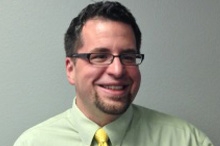

Bud Hunt is being honored as a Connected Educator Champion of Change.
My journey as a connected educator started roughly nine years ago when I began blogging about my teaching practice. I wanted to learn how to be a better teacher and how to incorporate the Web’s global audience and voice for my classroom of underprivileged high school students.
Through the open Web, I rediscovered my passion for democratic education, exploration and wonder, the love of a good poem, and the right people to share it with. I regained the power of connection with others around shared activities and interests. I was able to sustain myself as a passionate learner and help foster connections between my students and others all over the country. What was new to me then, but is habit now, was the idea that somewhere out there was someone who could teach me something I wanted to know. The challenge was that I had to find them.
Later, I would learn that what I was discovering about the power of interest-driven and peer-supported learning would eventually be known by some as Connected Learning. My friends and colleagues at the National Writing Project and their network of local school-university partnerships that have been so essential to my professional development would call it inquiry-driven learning. Whatever words we use, my experiences are like so many others’ who have taken to the Web - we meet individuals who are similar and different from us, who will then help us to become better people.
When I left my own high school classroom to work with teachers and students in their classrooms, I noticed two distinct types of learners. There were folks who saw a problem and responded to it with, “I don’t know, but let’s figure it out,” and there were those who, when faced with a problem, just decided to quit. I came to realize that an essential job of any educator is to help people build the ability to solve problems on their own, and to tinker their way to better situations for themselves and others. That’s why I find myself more and more drawn to Maker communities, and to other projects and organizations that are helping to build capacity in others. That’s also why I’m curious about how to cross-pollinate school spaces with non-traditional spaces like makerspaces. We have a lot to learn from one another, and there are plenty of important ways that educators and non-educators (but still learners) need to be in connection and conversation.
Technology, is often seen as an addition to the learning experience. In the 21st century, in a time of Common Core State Standards, that is no longer the case. Change is hard. Doing right by our students and each other is hard. Playing with the newest toys is easy, and can feel like change. But is good instructional practices, like all good habits, take time and effort to develop. The work of connected educators then involves helping learners to make connections to good tools and habits, and to break connections to the bad ones.
I am honored to be named a Champion of Change. I stand on the shoulders of those who have come before me, namely my teachers, students, and colleagues who have helped me to better understand myself and be a better learner. Here’s to all those who work daily to ensure that our schools help us remember to be the best of ourselves, and to instill the values of democracy and public discourse that have been so essential to our growth and continued improvement as a nation.
Bud Hunt is an instructional technologist for the St. Vrain Valley School District in northern Colorado, where he helps teachers and students to thoughtfully apply technology to their interactions with the world and each other.


